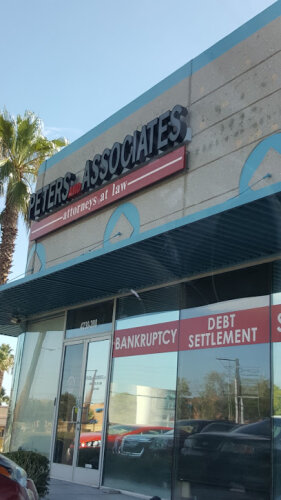Best Civil Litigation Lawyers in Las Vegas
Share your needs with us, get contacted by law firms.
Free. Takes 2 min.
List of the best lawyers in Las Vegas, United States
About Civil Litigation Law in Las Vegas, United States
Civil litigation covers legal disputes between private parties or organizations where one party seeks compensation, an order, or other relief from a court. In Las Vegas most civil cases are handled in Clark County courts, including Justice Courts for smaller claims and the Clark County District Court for general civil matters. Federal civil cases are filed in the U.S. District Court for the District of Nevada when federal law or diversity jurisdiction applies.
Procedures in Nevada are guided by the Nevada Rules of Civil Procedure, local court rules, and applicable state statutes. Civil cases typically move through stages such as pleadings, discovery, motion practice, settlement negotiations or alternative dispute resolution, and trial if the case does not resolve. Many disputes settle before trial, but preparation for trial remains important to preserve evidence and legal arguments.
Why You May Need a Lawyer
Civil litigation can be legally and procedurally complex. A lawyer can help you understand your rights, meet strict deadlines, gather and preserve evidence, prepare pleadings and motions, and represent you in court. You may need a lawyer in many common situations, including but not limited to:
- Personal injury claims after an automobile crash, slip and fall, or other accident where you seek compensation for medical bills, lost wages, or pain and suffering.
- Contract disputes involving businesses, landlords and tenants, construction projects, or consumer transactions.
- Real estate and boundary disputes, including title issues and disputes over easements.
- Employment disputes such as wrongful termination, wage and hour claims, or discrimination allegations.
- Insurance disputes where an insurer denies or undervalues a claim.
- Debt collection, creditor-debtor disputes, and foreclosure-related litigation.
- Consumer protection matters under Nevada statutes or federal laws.
- Complex business litigation including partnership disputes, shareholder claims, and commercial torts.
Even when you think a case is straightforward, an attorney can assess legal theories, evaluate potential recovery versus cost, and negotiate favorable settlements. Lawyers also reduce the risk of procedural mistakes that can result in lost rights or dismissal.
Local Laws Overview
Key local and state rules and features that affect civil litigation in Las Vegas include the following points. These are general guides - consult counsel or the specific statutes and court rules for your situation.
- Governing rules - Civil procedure in Nevada is governed by the Nevada Rules of Civil Procedure, supplemented by local rules for Clark County courts and individual judge practices. Familiarity with pleading requirements, discovery rules, motion practice, and scheduling orders is essential.
- Courts and jurisdiction - In Las Vegas common venues are the Justice Courts for small-dollar disputes and limited matters, Clark County District Court for general civil cases, and the U.S. District Court for Nevada for federal matters. Selecting the proper court is critical for venue and jurisdiction.
- Statutes of limitation - Time limits for bringing civil claims vary by claim type. Common examples include personal injury claims being subject to relatively short limitation periods, while contract claims often have longer periods. Missing a statute of limitation can bar a claim permanently, so act promptly.
- Discovery and evidence - Nevada permits broad discovery, including document production, depositions, interrogatories, and requests for admission. Courts enforce discovery obligations and may impose sanctions for abuse or noncompliance.
- Alternative dispute resolution - Mediation and arbitration are common and sometimes required by local rules, court order, or contract. Parties often resolve disputes through settlement conferences or private mediation to avoid the time and cost of trial.
- Comparative fault - Nevada applies principles of comparative fault, where a plaintiff’s recoverable damages may be reduced by the percentage of their own fault. Apportionment of fault among parties can significantly affect recovery.
- Small claims and simplified procedures - For lower-dollar disputes, small claims courts or justice courts provide simplified filing and faster resolution, with relaxed procedural formalities. Monetary limits and rules vary, so check the current thresholds and procedures before filing.
- Remedies and damages - Civil remedies can include compensatory damages, contract remedies, injunctive relief, declaratory judgments, and in certain circumstances punitive damages. Caps, statutory limitations, and proof requirements may apply depending on the claim.
Because laws and court procedures change and may vary by judge or court division, getting a local attorney or checking current Nevada statutes and local court rules is important early in your case.
Frequently Asked Questions
What counts as a civil lawsuit in Las Vegas?
A civil lawsuit is any non-criminal legal dispute where a private party seeks relief from another party. Typical matters include personal injury, contract disputes, property disputes, employment claims, landlord-tenant issues, and insurance coverage disputes.
How long will a civil case take?
Timing depends on the case complexity, court backlog, and whether parties settle. Simple matters in small claims or justice court can resolve in weeks to months. Complex cases in district court with extensive discovery can take a year or more. Mediation or early settlement can shorten the timeline.
What are the costs of civil litigation?
Costs include attorney fees, court filing fees, service of process, expert witness fees, deposition and transcript costs, and document production expenses. Many attorneys handle certain types of cases on contingency-fee arrangements, while others charge hourly rates or flat fees for specific services. Ask about fee structures and anticipated costs at your first consultation.
When should I hire an attorney?
Hire an attorney as soon as possible after a dispute arises or when you receive a complaint, summons, or demand letter. Early involvement helps protect evidence, preserve rights, identify deadlines, and shape strategy. Even before filing, a lawyer can evaluate options like demand letters, negotiation, or alternative dispute resolution.
Can I represent myself?
Yes, you have the right to represent yourself, which is called proceeding pro se. For simple, low-dollar claims this may be reasonable. For complex matters or when significant money, reputation, or legal rights are at stake, legal representation is strongly recommended to avoid procedural errors and to present the strongest case.
What is discovery and why does it matter?
Discovery is the process where parties exchange information and evidence before trial. It includes document requests, interrogatories, depositions, and requests for admission. Effective discovery uncovers facts, shapes settlement strategy, and prevents surprises at trial. Failure to comply with discovery obligations can lead to sanctions.
What if the other side wants to settle?
Settlement is common and often preferable to the time, expense, and risk of trial. A lawyer helps evaluate settlement offers, compares them against likely trial outcomes and costs, and negotiates terms including payment schedules, confidentiality, and release language. Never accept or reject a settlement without understanding its legal consequences.
How do statutes of limitation affect my claim?
A statute of limitation sets a deadline to file a lawsuit. If you miss that deadline, the court can dismiss your claim. Different claims have different limitation periods, and certain events can toll or extend deadlines. Consult an attorney quickly to determine applicable time limits for your matter.
What alternatives to trial are available?
Alternatives include negotiation, mediation, arbitration, and settlement conferences. Mediation is a voluntary, confidential settlement process with a neutral mediator. Arbitration is a binding or non-binding forum outside court that can be faster but limits appellate review. Contracts sometimes require arbitration, so check agreements carefully.
What should I bring to my first meeting with a lawyer?
Bring all relevant documents such as contracts, leases, insurance policies, correspondence, photographs, invoices, medical records if applicable, court papers, and a timeline of events. Prepare a concise summary of facts, key dates, and names of witnesses. This helps the attorney evaluate your situation and advise on next steps.
Additional Resources
Clark County District Court - primary trial court for major civil cases in Las Vegas.
Las Vegas Justice Court and other Justice Courts in Clark County - handle small claims and certain limited civil matters.
U.S. District Court for the District of Nevada - federal forum for civil cases raising federal questions or diversity jurisdiction.
Nevada State Bar - resources for finding a Nevada-licensed attorney, lawyer referral services, and ethics information.
Nevada Revised Statutes and Nevada Rules of Civil Procedure - the statutory and procedural framework governing civil claims in Nevada.
Local court self-help centers and pro se assistance programs - help for people representing themselves with forms and procedural guidance.
Legal aid organizations and consumer protection agencies - provide assistance for low-income individuals, housing disputes, and consumer complaints.
Next Steps
1. Collect and preserve evidence - Save contracts, emails, invoices, photographs, medical records, receipts, and any communications relevant to your dispute. Make backups of electronic files and note critical dates.
2. Identify deadlines - Determine if any statutes of limitation, contractual notice requirements, or court-imposed deadlines apply. Do not delay contacting counsel if time is limited.
3. Schedule an initial consultation - Meet with a local civil litigation attorney to review your matter, discuss legal options, evaluate potential costs, and consider likely outcomes. Ask about fee arrangements and whether the attorney offers contingency, flat-fee, or hourly billing.
4. Consider alternative dispute resolution - Ask whether mediation or arbitration is appropriate and whether a negotiated resolution might save time and expense.
5. Prepare for formal action if needed - If filing is required, your attorney will draft pleadings, file the complaint in the appropriate court, arrange service, and begin discovery and case management steps.
6. Stay informed and organized - Keep records of all legal communications, court documents, and expenses. Maintain a timeline and a list of witnesses or contact information that may be needed later.
Remember - this guide provides general information and does not replace legal advice. Laws and court rules change, and every case is unique. Consulting a licensed Las Vegas attorney will give you guidance tailored to your specific circumstances.
Lawzana helps you find the best lawyers and law firms in Las Vegas through a curated and pre-screened list of qualified legal professionals. Our platform offers rankings and detailed profiles of attorneys and law firms, allowing you to compare based on practice areas, including Civil Litigation, experience, and client feedback.
Each profile includes a description of the firm's areas of practice, client reviews, team members and partners, year of establishment, spoken languages, office locations, contact information, social media presence, and any published articles or resources. Most firms on our platform speak English and are experienced in both local and international legal matters.
Get a quote from top-rated law firms in Las Vegas, United States — quickly, securely, and without unnecessary hassle.
Disclaimer:
The information provided on this page is for general informational purposes only and does not constitute legal advice. While we strive to ensure the accuracy and relevance of the content, legal information may change over time, and interpretations of the law can vary. You should always consult with a qualified legal professional for advice specific to your situation.
We disclaim all liability for actions taken or not taken based on the content of this page. If you believe any information is incorrect or outdated, please contact us, and we will review and update it where appropriate.









